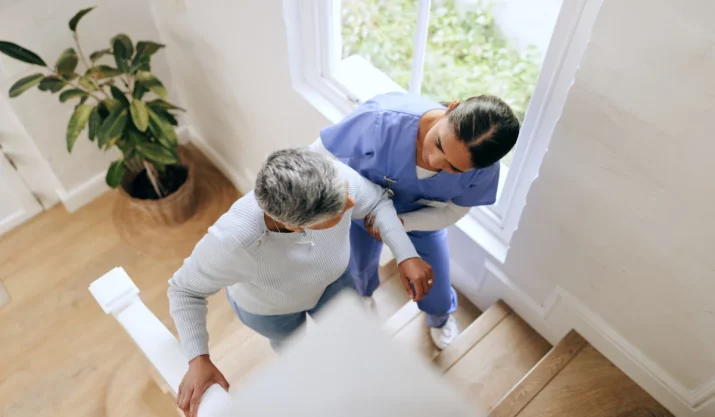When Assisted Living Is Not Enough: Signs It’s Time for More Care

Table of Contents
- Key Takeaways
- Medical Needs Are Too Complex for Assisted Living
- Memory Loss, Wandering, or Unsafe Behavior
- Struggling With Daily Tasks Like Bathing or Eating
- Depression or Isolation Is Affecting Mental Health
- Caregivers and Family Are Feeling Burned Out
- A Health Care Provider Recommends More Care
- Creating a Safer Home as Care Needs Change
Assisted living communities can be a great fit if your loved one needs help with day-to-day tasks but still wants to stay independent.
In California alone, more than 1,400 licensed assisted living facilities serve over 208,000 older adults. These communities usually offer on-site meals, personal care, medication management, and social activities.
Many residents need help with activities of daily living (ADLs), but most of these care facilities are concentrated in just a few counties. That means access isn’t equal for every family across the state.
Still, there may come a time when your loved one’s medical needs or personal care requirements go beyond what assisted living can handle.
Let’s look at some common signs that it might be time for more care.
Key Takeaways
- More medical needs often mean assisted living is no longer enough, and skilled nursing care may be needed instead.
- Memory problems, confusion, or wandering can signal it’s time for a safer setting like a memory care facility.
- Trouble with bathing, eating, or isolation can show your loved one now needs more personal and emotional support.
- California Mobility can help make homes safer with ramps and lifts when care needs increase.
Medical Needs Are Too Complex for Assisted Living
Assisted living residents usually have basic care needs. But if your loved one now needs help with wound care, injections, or other medical treatments, that’s more than most assisted living communities can handle.
In California, skilled nursing homes are built to care for people with more serious medical conditions. These care providers are trained to give medical care around the clock.
If your loved one’s medical condition is getting worse, they may need a care plan that includes more support and regular check-ins from health care professionals.
Memory Loss, Wandering, or Unsafe Behavior
If your loved one has been diagnosed with Alzheimer’s disease or is showing signs of dementia, their care needs can change quickly. It may start with forgetting appointments or misplacing items.
But as the condition progresses, you might notice confusion, mood swings, or even wandering into unsafe areas.
These changes often go hand-in-hand with an increased risk of falls or injuries.
While assisted living staff members do their best, they may not have the training or secure environment needed to manage these behaviors, especially as the condition becomes more advanced.
Memory care facilities are designed for this level of support.
Many are located within senior living communities and offer on-site features like secure layouts, trained staff, and structured routines.
These care options reduce risks and give families peace of mind that their loved one is in a safer, more supportive setting.
Struggling With Daily Tasks Like Bathing or Eating
Everyone needs help now and then.
But if your loved one can no longer do basic ADLs like getting dressed, bathing, or eating without help, they may need more support than assisted living can give.
Long-term care facilities are made for residents with major impairments. They provide hands-on help with all daily activities.
Some also offer skilled nursing care, which includes support for both medical and personal care needs.
Depression or Isolation Is Affecting Mental Health
Social life is a big part of senior living. But if your loved one seems withdrawn, anxious, or sad most of the time, something may be off. An estimated 20% of adults over 55 experience some type of mental health concern, with depression being the most common.
They might be dealing with a change in mental health or simply not connecting with the community anymore.
Switching to a different type of care, like home care or a more interactive senior care facility, might help.
In some cases, in-home care can give your loved one more one-on-one time and help improve their overall well-being.
Caregivers and Family Are Feeling Burned Out
When families are getting constant calls or asked to fill in the gaps more often, it’s usually a sign that assisted living isn’t meeting all of your loved one’s care needs.
Caregiver stress is real, and it can affect your health, too.
More families in California are turning to home health care, long-term care insurance, or even Medicare or Medicaid benefits to get the extra support they need.
Whether that means moving to a skilled nursing facility or adding in-home care services, it’s okay to ask for help.
A Health Care Provider Recommends More Care
If your loved one’s doctor, nurse, or care provider suggests moving to a higher level of care, take that seriously.
These professionals understand the type of care your loved one needs, based on their health conditions and ability to manage daily tasks.
A new care plan may include more supervision, frequent medical care, or even a complete shift from independent living to full-time support.
It can be hard to hear, but it can also lead to a better quality of life for your family member.
Creating a Safer Home as Care Needs Change
When your loved one needs more care, their safety at home becomes even more important. At California Mobility, we help families across the state adapt their living spaces to meet new physical challenges.
From stair lifts and vertical platform lifts to ramps and home elevators, our products are designed to support independence, reduce fall risks, and make everyday life easier, whether your family member is staying at home or returning from a care facility.
Contact us today to learn how we can help make your home safer and more accessible for the next stage of care.






